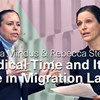operates
Bi Puranen moderates debate at UNESCO
On the 25–26th of March, UNESCO organizes a big international workshop titled "Measuring Social Public Policies: Inclusiveness and Impact" in Paris. The workshop is organized within UNESO's Management
How do Europeans want to fight climate change? Comparing and explaining public support for a wide variety of policies
Journal of Public Policy Abstract Most people are concerned about climate change and want policymakers to address it. But how? To investigate which policy options are more versus less popular, with whom
Governing for Future Generations: How Political Trust Shapes Attitudes Towards Climate and Debt Policies
in: Frontiers in political science AbstractPolicy decisions, and public preferences about them, often entail judgements about costs people should be willing to pay for the benefit of future generations
Thomas Christiano: The Tension between the Nature and the Norm of Voluntary Exchange
Thomas Christiano, Professor of Philosophy at the University of Arizona ABSTRACTI argue we can make a great deal of progress in understanding the promise and the perils of voluntary exchange by elabora
Patricia Mindus and Rebecca Stern: Juridical Time and Its Role in Migration Law - A Focus on Sweden
Venue: Holländargatan 13, Stockholm, or online. Research seminar with Patricia Mindus and Rebecca Stern. Patricia Mindus is Professor in Practical Philosophy at Uppsala University. Her research mainly f

Patricia Mindus and Rebecca Stern: Juridical Time and Its Role in Migration Law
In Sweden and other countries, a clear trend in migration law in recent years has been a shift from permanent towards temporary: time-limited residence permits, revocation of refugee status, higher th

Kremlin influence and the destabilization of Swedish democracy
An analysis of geostrategic market offensives, Russian influence operations, Swedish partners, and the threat of oligarchic capitalism
Rainer Bauböck: Globalization, new technologies and the future of democratic citizenship
Professor of Social and Political Theory, European University Institute. ABSTRACT Liberal democratic citizenship has been shaped by the legacies of Athens (democracy) and Rome (legal rights) but operate between individuals and states. In a Westphalian world, citizenship has both instrumental and identity value. Enhanced opportunities and interests in mobility rights strengthen instrumental interests in multiple citizenship among immigrants, among populations in less developed countries, and among wealthy elites. The latter two trends potentially undermine a genuine link norm and, if they prevail, might replace the Westphalian allocation of citizenship with a global market. New digital technologies create a second challenge to Westphalian citizenship. As has argued, digital identities could provide a global legal persona for all human beings independently of their nationality, and blockchain technologies could enable the formation of non-territorial political communities providing governance services to their members independently of states. Both the instrumental uses of citizenship for geographic mobility and technologies that create substitutes for territorial citizenship are not merely relevant as current trends. They are also advocated and defended normatively as responses to the global injustice of the birthright lottery. I will challenge this idea and argue that liberal democracies should not be conceived as voluntary associations whose membership is freely chosen, but as communities of destiny among people who have been thrown together by history and their circumstances of life. How these foundations of democratic community can be maintained in the context of rising mobility and the digital revolution remains an open question.
Myths and truths about "the experiment"
The Swedish response to Covid-19 put in context.
What to lobby on? Explaining Why Large American Firms Lobby on the Same or Different Issues
Business and Politics Abstract What determines whether or not firms lobby on the same policy issues? Scholars offer two broad answers to this question. Firms that are (1) similar or (2) connected throug








